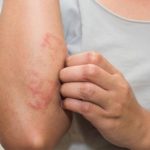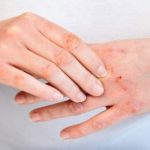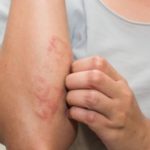It is important to monitor your skin for any abnormal symptoms or increased itching after getting a tattoo. This precautionary measure helps prevent potential complications and underlying health issues. Join Bach Hoa XANH as we explore tips to relieve tattoo itching in this article!
1 Is Itching Normal After Getting a Tattoo?
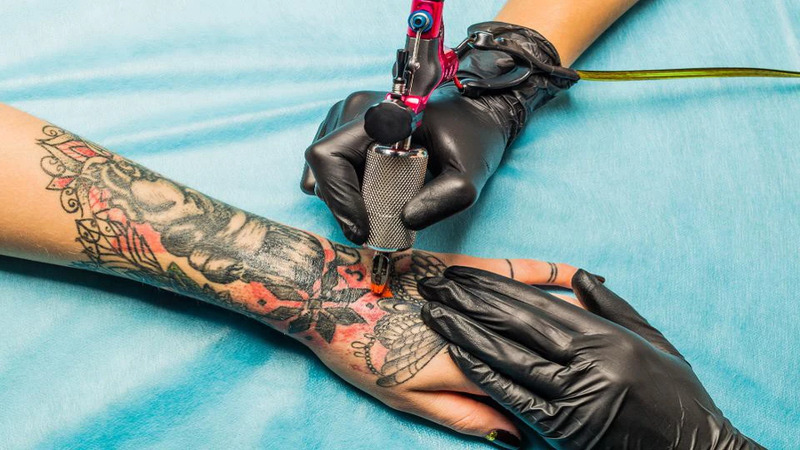 Is Itching Normal After a Tattoo?
Is Itching Normal After a Tattoo?
Experiencing itching after getting a tattoo is a common occurrence. When the skin is damaged during the tattooing process, the body often responds by sending itch signals to that area. This can be a normal reaction as the body works to heal the skin.
However, if the itching persists or is accompanied by other symptoms such as redness, swelling, or a rash, it is advisable to consult a doctor or specialist for appropriate advice and care. Sometimes, itching can be a sign of a more serious issue, such as an allergic reaction or infection, so monitoring and caring for your skin post-tattoo is crucial.
2 Reasons Why Your Tattoo Itches
The Natural Healing Process
After getting a tattoo, the healing process begins with the formation of scabs and new skin, along with itching and irritation. To prevent skin damage and infection, refrain from scratching or picking at the scab. Scratching can cause scarring and distort the tattoo, which is undesirable. After getting a tattoo, you will usually receive an ointment to apply to the tattooed area, and it is important to keep it away from water. The itching should gradually subside within 1-2 weeks.
Infection
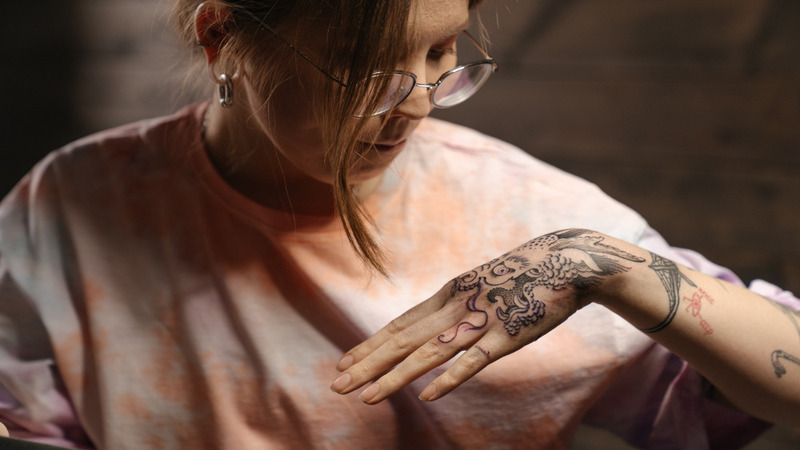 Tattoo Itching Due to Infection
Tattoo Itching Due to Infection
Infection is a common cause of tattoo itching. It occurs when bacteria or other microorganisms enter the skin that has been punctured during the tattooing process.
These microorganisms can trigger an inflammatory response in the body, leading to symptoms such as redness, swelling, pain, and itching. This usually happens when the tattoo artist does not follow proper hygiene practices or when aftercare instructions are not followed correctly.
Symptoms of an infection may include:
- Swelling and itching at the tattoo site
- Prolonged pain
- Redness that spreads beyond the tattooed area
- Long red streaks on the skin
- Chills and fever
If you suspect an infection, seek immediate medical attention to receive proper advice and treatment, preventing any potential complications.
Allergic Reaction
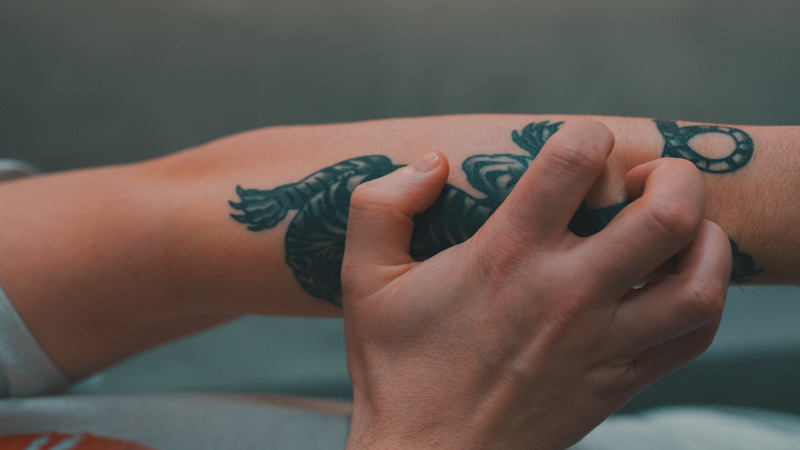 Tattoo Itching Due to Allergic Reaction
Tattoo Itching Due to Allergic Reaction
Allergic reactions to tattoos are often due to an overreaction by the body to the components in the ink or other chemicals used during the tattooing process. These substances can irritate the skin, leading to an allergic reaction or inflammation. Common allergens include dyes, thickeners, softeners, or preservatives in the ink.
Mild and temporary allergic reactions may include:
- Scabbing and peeling skin
- Leaking fluid from the tattoo
- Pimples or bumps
- Blistering
- Redness and itching
These issues should subside within a short period. However, if you experience more severe symptoms, consult a dermatologist or physician if you notice:
- Severe swelling
- Rapid heartbeat
- Hives
- Dizziness
- Chest tightness
- Difficulty breathing
Sun Allergy
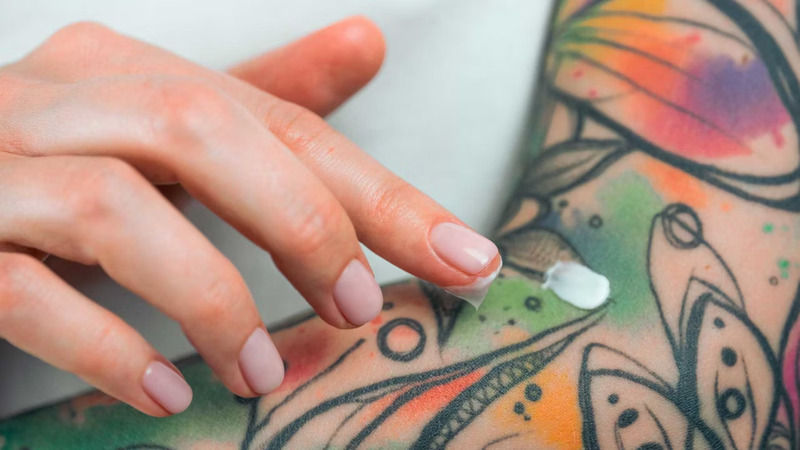 Sun Allergy
Sun Allergy
Sun exposure can cause tattoo itching, often due to individual skin sensitivity and the ink’s components. Under sunlight, certain ink components can interact with the skin, leading to the following reactions:
- Small itchy bumps
- Hives
- Redness
- Swelling and blistering
To prevent tattoo itching due to sun exposure, consider the following simple measures. First, always apply a broad-spectrum sunscreen with an SPF of 30 or higher when going outdoors, especially on tattooed areas. Choose a sunscreen that does not contain irritating ingredients.
Additionally, cover up your tattoo with clothing that provides adequate protection from the sun. Limit direct sun exposure during peak hours, and practice proper skin care to keep your skin moisturized and healthy. Proper skin protection and care will help prevent itching and maintain the vibrancy of your tattoo over time.
Eczema
Eczema, a type of chronic skin inflammation, can be a cause of tattoo itching. It typically presents with symptoms such as itching, redness, and cracked skin. When bacteria or fungi grow on the tattooed area, it can trigger an inflammatory response, leading to itching and discomfort.
Before getting a tattoo, discuss with your artist the use of ink suitable for sensitive skin. Carefully selected ink can minimize the risk of irritation or skin reactions for those with sensitive skin or eczema.
Additionally, there are special tattoo aftercare creams designed not to affect the ink. These creams typically do not contain irritating ingredients and will not cause adverse reactions when in contact with the ink. Your tattoo artist can provide recommendations and advice on choosing the most suitable cream for your skin type and for maintaining the color and details of your tattoo.
Psoriasis
Psoriasis, a chronic and non-contagious disease, can be a factor in tattoo itching. The National Psoriasis Foundation has stated that even minor injuries, such as a vaccine injection, can trigger psoriasis in some individuals.
This indicates that some people’s skin may react strongly to any stimulus, including minor injuries or brief contact. Therefore, tattooing can induce an irritant reaction, increasing itching, redness, and scaling in the tattooed area.
3 What to Do When Your Tattoo Itches
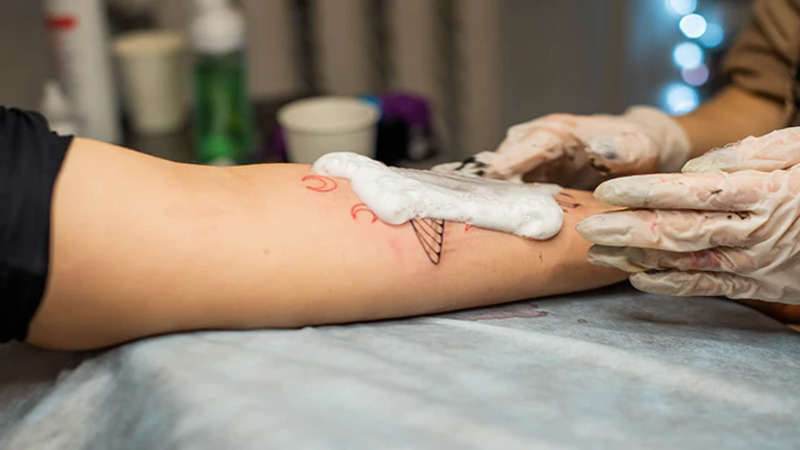 What to Do When Your Tattoo Itches?
What to Do When Your Tattoo Itches?
Depending on the cause of the itching, there are specific measures to address it while ensuring the safety of your health and tattoo. Preventing tattoo itching from the start not only provides comfort but also protects and maintains the beauty of your tattoo, promoting better wound healing.
Here are some tips to reduce tattoo itching during the skin’s natural healing process:
- Use moisturizing creams or ointments
- Refrain from scratching or picking
- Do not peel off the scab
- Keep the area clean
- Pay attention to your diet
- Avoid sun exposure and water
- Follow your tattoo artist’s aftercare instructions
Consult a dermatologist or physician if you experience the following:
- Persistent itching despite trying various methods for several weeks
- Leaking fluid or pus
- Intense itching
- Spreading redness
- Blistering
- Severe swelling
- Fever
Through this article, we hope to have provided you with a better understanding of tattoo itching and its treatment. We trust that you have found this information useful and that it will assist you in effectively caring for your tattoo.
Source: hellobacsi.com
























